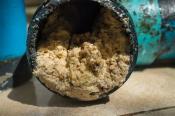Wastewater Treatment
Did you know we have koi fish in our clarifier at the wastewater treatment plant?
Watch the above video to learn about the role Koi have in not only keeping the clarifiers clean, but also by giving warnings on chemical levels!
Don't flush trash
Use a trash can instead of the toilet to dispose of used wipes, hygiene products and other items that don’t break down like toilet paper.
Even if the label says “flushable”, wipes, tampons and other trash can build up in the sewer system and cause overflows that might damage property, hurt the environment, or make people sick.
Wipes, trash and debris are a costly problem for cities and local sewer agencies, too. Putting the wrong things down sinks and toilets might also cause expensive plumbing problems in your home or business.
What happens when grease is washed down the drain?

When grease is washed down the drain, it sticks to the inside of sewer pipes (both on your property and in the streets). Over time, it builds up and can block an entire pipe.
Garbage disposals do not keep grease out of the pipes, they only shred it into smaller pieces. Commercial additives, including detergents that claim to dissolve grease, may pass it down the line and cause problems away from the source.
The results of a grease-blocked sewer pipe can be:
- Sewage overflows in your home or your neighbor's home
- Expensive and unpleasant cleanup that often must be paid for by the property owner. The average cleanup cost is about $3,000 which does not include replacing carpets and repairing walls.
- Possible contact with disease-causing organisms
- An increase in operation and maintenance costs by the local sewer plant and higher sewer bills for customers.
